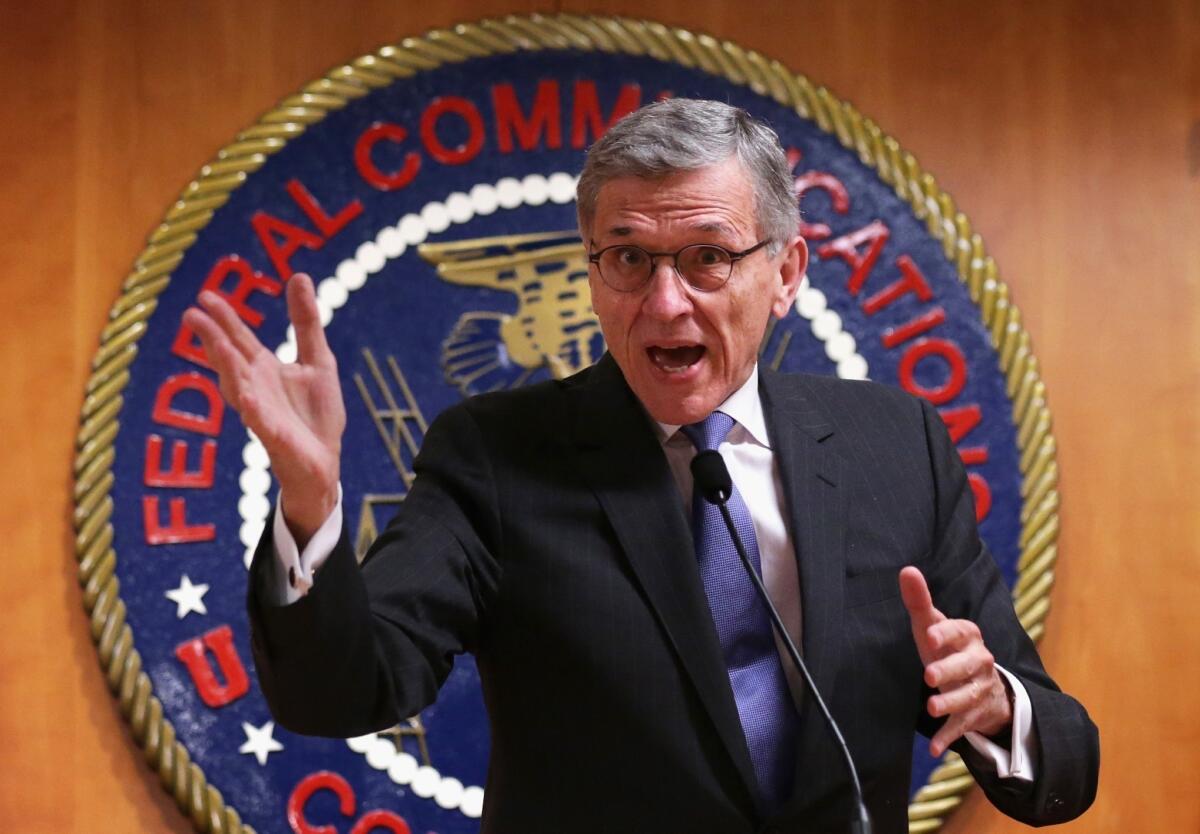FCC chairman gets bipartisan grilling over Net neutrality proposal

- Share via
Reporting from Washington — Federal Communications Commission Chairman Tom Wheeler on Tuesday faced bipartisan criticism from House members concerning proposed new rules governing Internet traffic, highlighting the controversy over his attempt to steer a middle path in the Net neutrality debate.
Republicans said Wheeler’s plan goes too far, threatening to stifle the Internet’s growth.
“The Internet has flourished under the current light-touch regulatory scheme, and subjecting it to burdensome regulations is a leap in the wrong direction,” Rep. Fred Upton (R-Mich.), chairman of the House Energy and Commerce Committee, told Wheeler at an oversight hearing.
Many Democrats think Wheeler’s effort doesn’t go far enough in asserting stronger regulatory powers to prevent broadband providers from charging companies more for higher-speed delivery of their content.
“Paid prioritization divides the Internet into haves and have-nots, and it will entrench the big companies at the expense of start-ups,” said Rep. Henry Waxman (D-Beverly Hills).
Wheeler said his plan attempts to reinstate rules protecting Internet traffic that can stand up to legal review.
“I understand that there is a great debate on this issue,” Wheeler said, a nod not only to the comments at the hearing but protests last week outside the FCC’s headquarters.
“I’ve consistently said that there is only one Internet,” Wheeler said.
“There’s not a fast Internet and a slow Internet ... and when the consumer buys access to the Internet, they are buying access to the full Internet and that’s what our rules attempt to protect,” he said.
With the backing of the agency’s other two Democrats, Wheeler was able to advance his Net neutrality plan last week. The party-line 3-2 vote started a four-month comment period on important questions about how to ensure that broadband providers don’t become gatekeepers of Internet content.
One key question is whether broadband providers should be subjected to tougher, utility-like regulation under the nation’s telecommunications law.
Republicans oppose any Net neutrality rules, arguing that the Internet has flourished in large part because it has been free from heavy government regulation. They are particularly upset about the idea of reclassifying Internet providers as so-called common carriers, similar to phone companies.
Rep. Greg Walden (R-Ore.) said such a move would “give the bureaucrats at the FCC the authority to second-guess business decisions and to regulate every possible aspect of the Internet.”
Wheeler’s plan comes after a federal court in January tossed out the agency’s 2010 Net neutrality rules.
Under his proposal, Internet service providers would be prohibited from blocking access to any legal content, prioritizing delivery of their own content, and slowing the speed of service below the level the user had contracted for.
A watchdog position would be created to look for abuses
But Wheeler’s plan could allow Internet service providers to charge companies and websites for faster delivery of their content to consumers. The proposal seeks public comment on whether such paid prioritization should be banned.
Lawmakers tried to pin down Wheeler on whether he opposed allowing paid prioritization. He didn’t say so directly but suggested he did in some cases.
Some Democrats said it should be banned.
“If this concept moves forward, we could inadvertently block the next Google or Amazon from the market without even knowing it,” said Rep. Doris Matsui (D-Sacramento).







